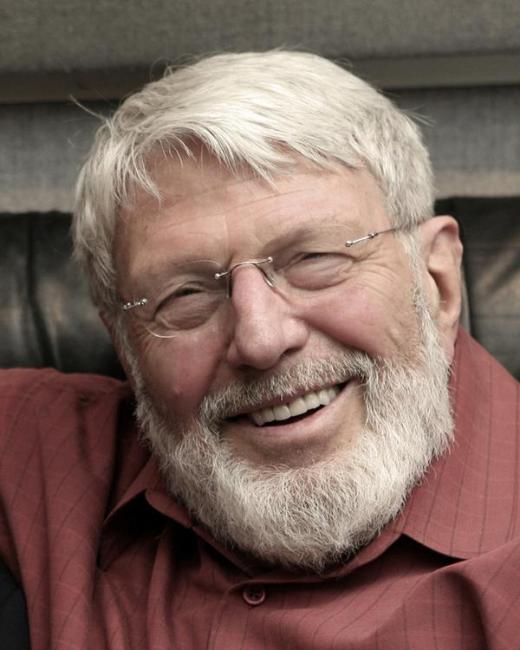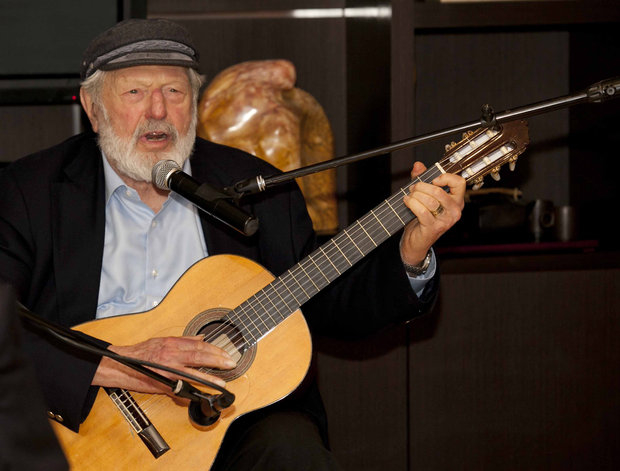Tad Taube, Shana Penn, and the Taube Foundation for Jewish Life & Culture mourn the loss of our dear friend and colleague Theodore Bikel, who passed away in Los Angeles on Monday, July 20. He was 91.

A true renaissance man for our time, Theo regaled and enlightened us through music, sharing the breadth and depth of his love for Jewish heritage and its interplay with other folk and cultural traditions.
He was perhaps best known in mainstream culture for his musical theater and film performances on and off Broadway and in Hollywood, originating the role of Captain von Trapp in "The Sound of Music" on Broadway and performing the lead role of Tevye in "Fiddler on the Roof" at least 2,000 times starting in 1967; he played Tevye more than any other actor in "Fiddler's" history.
Theodore Meir Bikel was born in Vienna in 1924 and enjoyed the city's and his family's rich cultural life until the Nazi invasion of Austria in 1938. Soon after Kristallnacht, his family fled to Palestine. He loved living in Palestine, and began acting while still in his teens and making his stage debut as the Village Clerk in "Tevye the Milkman" at the Habimah Theater in Tel Aviv in 1943. The next year he co-founded the city's Cameri Theater, which went on to become one of Israel's foremost theaters.
Theo drew his first Tony nomination in 1958 for "The Rope Dancers" and received his second two years later for "The Sound of Music." During the 1950s, Theo also produced and sang on several albums of Jewish folk songs, and right before "The Sound of Music" was to open on Broadway, Rodgers and Hammerstein wrote the song "Edelweiss" specifically for him to sing and accompany himself on the guitar.

Theo was always socially and culturally active. In the late 1970s and early 80s he served as president of the Associated Actors and Artists of America, a federation of trade unions for performing artists in the U.S. including Actors' Equity and the Screen Actors Guild. Apart from his work as an entertainer, Bikel was active in numerous human rights and liberal political causes spanning decades. He was active in the U.S. civil rights movement; advocated for freedom for Soviet Jews and met with Jewish dissidents in the USSR; protested South African apartheid; worked to establish the National Council on the Arts; testified before Congress on behalf of the Arts; and has met U.S. presidents from JFK to Clinton.
In 2010 Theo was nominated for the Drama Desk Award for outstanding solo performance for "Sholom Aleichem: Laughter Through Tears." This one-man theater piece on Sholom Aleichem was followed by a documentary film, "Theodore Bikel: In the Shoes of Sholom Aleichem," which has been showing at film festivals since its premiere at the San Francisco Jewish Film Festival in 2014 (which sold out the Castro Theater's 1,400 seats), including in Warsaw, Australia, and Israel. The Taube Foundation is proud to have supported this film project, as well as to have had the honor of hosting Bikel's performance as part of the "Fiddler at 50" festivities in the Bay Area in January 2014 (together with internationally acclaimed Bosnian accordionist Merima Ključo).
Theo is survived by his fourth wife, Aimee Ginsburg-Bikel, sons Rob and Danny, stepsons Zeev and Noam Ginsburg and three grandchildren. His third wife, composer Tamara Brooks, passed away in 2012. Theo's passing is deeply felt. He will be dearly missed.
Below please find an excerpt of a speech by Leon Wieseltier delivered in honor of Theo, upon receiving YIVO's Lifetime Achievement Award, at a ceremony that took place at the Center for Jewish History in New York on June 18 (the entire speech was published in Tablet Magazine).
Leon Wieseltier:
"What is missing from American Jewishness now is a sense of the whole—a robust and natural awareness of our inherited abundance. We lack the consciousness that we are nothing less than a civilization. A great Jewish historian, adapting an ancient Latin adage, famously remarked that 'nothing Jewish is alien to me.' Who can say this now? Who has, or aspires to have, an appreciation and a knowledge and a love of this scope? Who any longer remembers how to be an heir to it all?
"I have at least one answer to that question. The answer is, Theo Bikel remembers. He is a man of the whole. The range of his Jewishness is as exhilarating as it is rare: He is immersed in the entirety of Jewish expression. He possesses the languages and he possesses the literatures. He knows all the songs, and the meanings of all the songs. He knows how we daven and he knows how we demonstrate. He is a son of Vienna and a son of Tel Aviv and a son of New York and Los Angeles—of the center and the peripheries, the homeland and the dispersion. He does not choose among them; he represents, and cherishes, and refines, them all. His Jewish cultivation is breathtaking. His many agitations on behalf of human rights and social justice have always been conducted in a Jewish vocabulary—he has been an ambassador of our ethics to the world.
"Theo is one of the greatest of our culture's guardians, and of its connoisseurs. His company is an intense—and almost giddily delightful—experience of Jewish cultivation. His laughter is itself a high form of yiddishkeit. A culture's best shorthand, after all, is its humor; and if one of the measures of the decline of a grander and more synoptic Jewishness is that there are fewer and fewer people to whom one can tell our jokes, then I wish to proclaim, as a summary of Theo's reach as a Jew, that he is the man who gets all the jokes and tells all the jokes. He relieves a certain Jewish loneliness. So here at YIVO you have chosen brilliantly: I can think of nobody who more richly deserves an award that extols Jewish heritage than this man, this universal Jew. It has been one of the privileges of my own life as a Jew to have been a Jew together with him on this cruel and beautiful earth."
